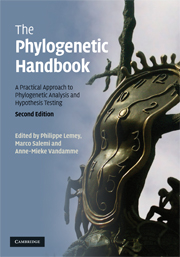Book contents
- Frontmatter
- Contents
- List of contributors
- Foreword
- Preface
- Section I Introduction
- Section II Data preparation
- Section III Phylogenetic inference
- Section IV Testing models and trees
- Section V Molecular adaptation
- 13 Natural selection and adaptation of molecular sequences
- 14 Estimating selection pressures on alignments of coding sequences
- Section VI Recombination
- Section VII Population genetics
- Section VIII Additional topics
- Glossary
- References
- Index
14 - Estimating selection pressures on alignments of coding sequences
from Section V - Molecular adaptation
Published online by Cambridge University Press: 05 June 2012
- Frontmatter
- Contents
- List of contributors
- Foreword
- Preface
- Section I Introduction
- Section II Data preparation
- Section III Phylogenetic inference
- Section IV Testing models and trees
- Section V Molecular adaptation
- 13 Natural selection and adaptation of molecular sequences
- 14 Estimating selection pressures on alignments of coding sequences
- Section VI Recombination
- Section VII Population genetics
- Section VIII Additional topics
- Glossary
- References
- Index
Summary
THEORY
Introduction
Understanding the selective pressures that have shaped genetic variation is a central goal in the study of evolutionary biology. As non-synonymous mutations can directly affect protein function, they are more likely to influence the fitness of an organism than mutations that leave the amino acid sequence unchanged (i.e. synonymous mutations). Under negative or purifying selection, less “fit” non-synonymous substitutions accumulate more slowly than synonymous substitutions, and under diversifying or positive selection, the converse is true. Therefore, an important concept in the analysis of coding sequences is that the comparison of relative rates of non-synonymous (β) and synonymous (α) substitutions can provide information on the type of selection that has acted on a given set of protein-coding sequences. The ratio ω = β/α (also referred to as dN/dS or KA / KS) has become a standard measure of selective pressure (Nielsen & Yang, 1998); ω ≈ 1 signifies neutral evolution, ω < 1 – negative selection and ω > 1 – positive selection.
There are five fundamental questions which can be answered with existing methods and software tools that estimate such substitution rates.
Information
- Type
- Chapter
- Information
- The Phylogenetic HandbookA Practical Approach to Phylogenetic Analysis and Hypothesis Testing, pp. 419 - 490Publisher: Cambridge University PressPrint publication year: 2009
Accessibility standard: Unknown
- 15
- Cited by
